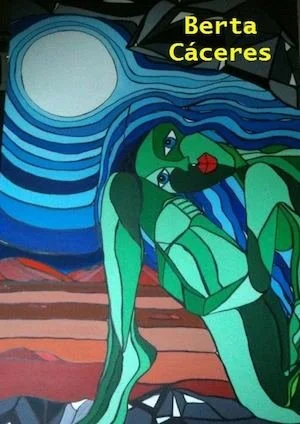Berta Cáceres
1971-2016
Honduras
Berta Cáceres was born on March 4, 1971, in La Esperanza, Honduras to a Catholic family of Lenca heritage. The daughter of a midwife, humanitarian, and activist, she traveled to El Salvador to support the Salvadoran revolution in the 1980s. Having witnessed the ravages of war firsthand, Berta returned to Honduras seeking paths of nonviolent transformation that would resist socioeconomic injustice and defend Indigenous peoples and rural territories from extractivism. In 1993, Berta co-founded the Civic Council of Popular and Indigenous Organizations of Honduras (COPINH), which successfully resisted multiple extractivist projects in the mountainous regions of Honduras. Berta reclaimed her family’s Indigenous identity and insisted on the rights of the Lenca people to defend their sacred lands and waters. With her leadership, COPINH also promoted the full incorporation and leadership of women and LGBTQ+ folks in the work of the organization. In Berta’s estimation, the struggle against the extractivist paradigm of neoliberal capitalism could not be separated from struggles against patriarchy and racism. For over two decades, Berta and other members of COPINH were targets of smear campaigns and death threats to themselves and their families. As extractivist projects proliferated and hydroelectric dams were popping up throughout Honduras, one river particularly at risk was the Gualcarque River, sacred to the Lenca people and essential to the life of the Río Blanco community. When construction for the Agua Zarca dam began in 2012, it was clear the company had violated the rights of Indigenous peoples to prior, free, and informed consultation regarding the use of their sacred and life-sustaining river. COPINH organized resistance to the project and eventually blocked the road to the construction site for two whole years, even in the face of harassment and violence, including the murder of Tomás Garcia in 2013. Berta was awarded the prestigious Goldman Environmental Prize in 2015 for her role in the struggle against the Agua Zarca dam project, a struggle which continued when Berta returned home from receiving the award. She had a trip to Europe scheduled to put pressure on international banks and corporations to divest from this project and others like it, but the trip never came to pass. In the late hours of the night on March 2, 2016, Berta Caceres was shot to death in her home in La Esperanza. She was forty-four years old, just two days shy of her forty-fifth birthday. As those who remember her put it, “Berta did not died, she multiplied.”
Videos
Documentary about Berta and COPINH made in 2013, three years before Berta’s assassination.
Documentary about Berta’s legacy and the continued struggle of communities to defend their rivers
Interview with Berta Cáceres, Honduras (2014).
Goldman Prize Videos
Goldman Environmental Prize, Honduras, 2015.
Berta’s acceptance speech, Goldman Prize Ceremony, 2015.
Tribute to Berta at the 2016 Goldman Prize Ceremony, 2016.
Music
Many songs have been written about Berta Cáceres and the legacy that she has left for her people and all those who struggle for life and against racism, patriarchy, and capitalist extractivism. Several other songs are featured in this article.
El corrido de Berta Cáceres -
Marlo y Gabriel
Que corra el río
Karla Lara
English Lyrics PDF
Guardiana del río
Las CEBs Cantamos
Poetry and Visual Art
The BIBLIOTECA DE LAS GRANDES NACIONES has edited a book filled with the work of poets and artists from various countries who come together in this format to remember and pay homage to Berta Cáceres.
The book is simply entitled BERTA CÁCERES and can be accessed at the link below.
Image Gallery





